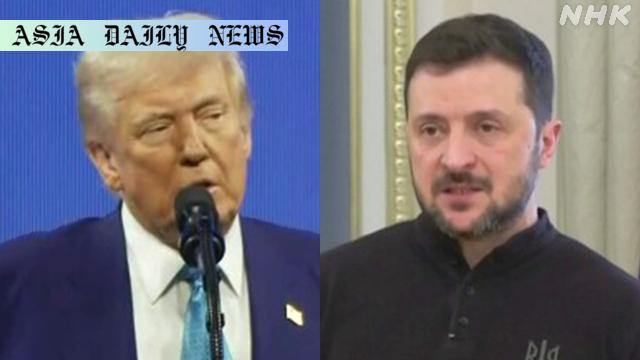Zelenskyy: US President Donald Trump has labeled Ukrainian President Volodymyr Zelenskyy a ‘dictator without elections.’ This has caused global outrage and criticism from international leaders.

Introduction
In a recent series of comments, US President Donald Trump referred to Ukrainian President Volodymyr Zelenskyy as a ‘dictator without elections.’ These remarks have sparked widespread global condemnation, particularly as Ukraine continues its long and arduous fight against Russian aggression. The statements have raised questions about their potential geopolitical implications and have prompted responses from several prominent world leaders who have reaffirmed Zelenskyy’s legitimacy as a democratically elected leader.
The Context: Trump’s Controversial Statements
On Wednesday, while speaking in Florida, Trump criticized Ukrainian President Zelenskyy on the grounds of alleged ‘low support’ in Ukraine and a supposed refusal to conduct elections amidst the ongoing conflict. Trump’s rhetoric painted Zelenskyy as a ‘dictator without elections’ and questioned his leadership capabilities during a critical time for Ukraine. Trump also expressed skepticism about the direction in which the ongoing conflict is headed, warning that it could lead to further devastation in Ukraine.
Trump’s comments were reiterated on social media through posts that further emphasized his belief that Zelenskyy was clinging to power undemocratically. These statements come when Ukraine’s efforts to defend itself against Russian invasion have garnered significant international support, particularly from Western allies such as the United States, the United Kingdom, and Germany.
Global Leaders Respond to the Outrage
The global response to Trump’s remarks has been swift and critical. UK Prime Minister Keir Starmer voiced his support for Zelenskyy during a phone call with him on Wednesday. A spokesperson for Starmer emphasized that the British leader expressed unequivocal backing for Zelenskyy as Ukraine’s democratically elected president.
German Chancellor Olaf Scholz also weighed in, taking to social media to call Trump’s accusations ‘simply wrong and dangerous.’ Scholz’s comments highlight the risks of undermining Ukraine’s leadership at a time when international solidarity remains vital to thwarting Russian aggression. Similarly, the United Nations reaffirmed Zelenskyy’s legitimacy, with a spokesperson emphasizing that the Ukrainian leader holds his position after duly held elections.
Implications for US-Ukraine Relations
Trump’s remarks could have far-reaching consequences for US-Ukraine relations. Throughout the ongoing conflict, Ukraine has relied heavily on US military and financial aid to sustain its defense efforts. While President Joe Biden’s administration has been a staunch supporter of Ukraine, Trump’s comments signal potential shifts in US foreign policy should he regain power in the 2024 presidential elections. Observers speculate that such rhetoric could weaken bipartisan support for Ukraine in Washington.
It’s also worth noting that Trump’s approach seems to diverge significantly from the broader US foreign policy consensus. His characterization of Zelenskyy contrasts starkly with the Biden administration’s messaging, which has consistently framed Ukraine as a democratic stronghold resisting Russian authoritarianism.
The Broader Geopolitical Ripple Effect
Trump’s divisive statements come at a critical juncture for Ukraine. The country continues to face relentless attacks from Russian forces, with cities being bombarded and vital infrastructure destroyed. The rhetoric used by world leaders, particularly those from powerful nations like the US, can significantly influence international perceptions and aid efforts. Trump’s remarks, therefore, risk undermining Ukraine’s standing on the global stage by sowing doubt about its leadership during a period of crisis.
Moreover, such statements can embolden adversaries like Russia, which has sought to delegitimize Zelenskyy’s government as part of its propaganda campaigns. For Ukraine, maintaining unwavering international support is essential not just for immediate defense but also for long-term recovery and rebuilding efforts.
Conclusion
As the world watches the ongoing developments in Ukraine, President Trump’s comments have ignited a critical debate on leadership legitimacy and the impact of rhetoric during wartime. While international leaders like Keir Starmer and Olaf Scholz have publicly condemned the remarks and reaffirmed their support for Zelenskyy, the incident underscores the complexities of global diplomacy amidst evolving geopolitical tensions. For Zelenskyy and Ukraine, the stakes remain extraordinarily high, and global solidarity will be a determining factor in the country’s ability to persevere.
Commentary
Unpacking Trump’s Remarks
The recent remarks by President Donald Trump labeling Ukrainian President Zelenskyy a ‘dictator without elections’ certainly raise several eyebrows. At a time when Ukraine is embroiled in one of its most challenging crises, the need for clear and supportive rhetoric from influential global figures cannot be overstated. Trump’s assertions, however, not only seem misinformed but also undermine the democratic credentials of a leader who has been a symbol of Ukraine’s resistance against autocracy.
The Importance of Solidarity
It’s worth highlighting that global solidarity for Ukraine has been a cornerstone of its resilience. Criticisms like those leveled by Trump could inadvertently erode this solidarity. Allies like Britain, Germany, and even international institutions such as the United Nations have vehemently defended Zelenskyy, a testimony to his legitimacy. Still, such rhetoric can embolden adversaries like Russia, which thrives on narratives that cast Ukraine’s leadership as ineffective or illegitimate.
The Role of US Leadership
The role the US plays in shaping global perception cannot be overstated. Comments from a former president and potential 2024 candidate carry significant weight. They must be carefully crafted to avoid undermining years of efforts to establish unity among Western allies in support of Ukraine. While it is appropriate to discuss potential strategies and improvements in aid, outright dismissal of a democratically elected leader seems counterproductive at best and harmful at worst.
Final Thoughts
Ultimately, this incident underscores the importance of responsible leadership and the weight of public statements in shaping global discourse. As Zelenskyy continues to lead Ukraine through unparalleled difficulties, the world must remain vigilant against narratives that weaken global unity in the face of oppression and aggression.


